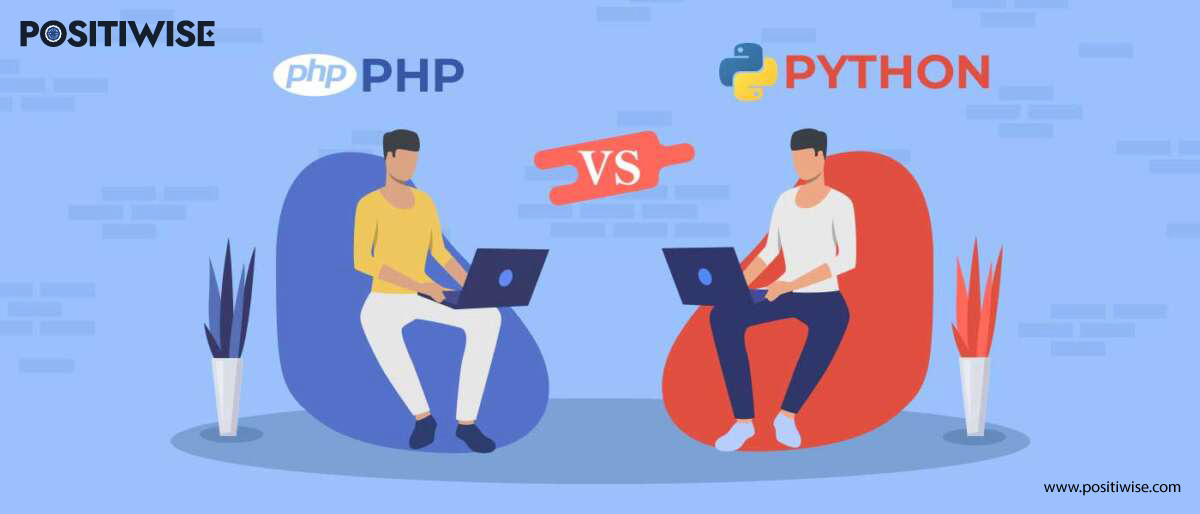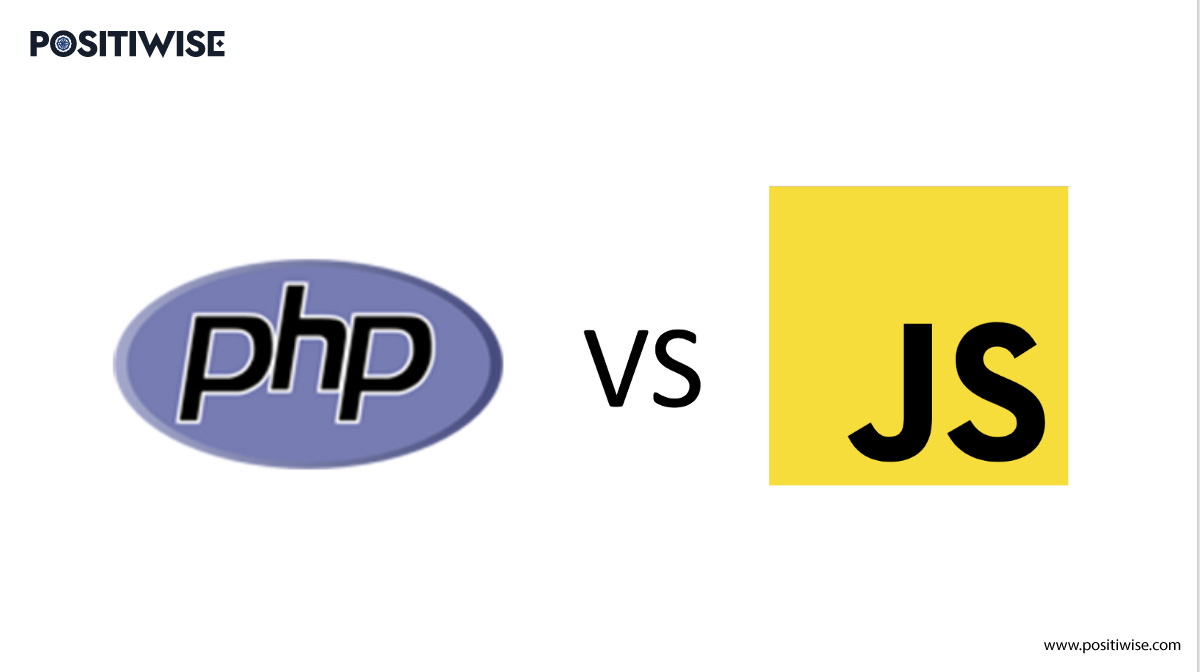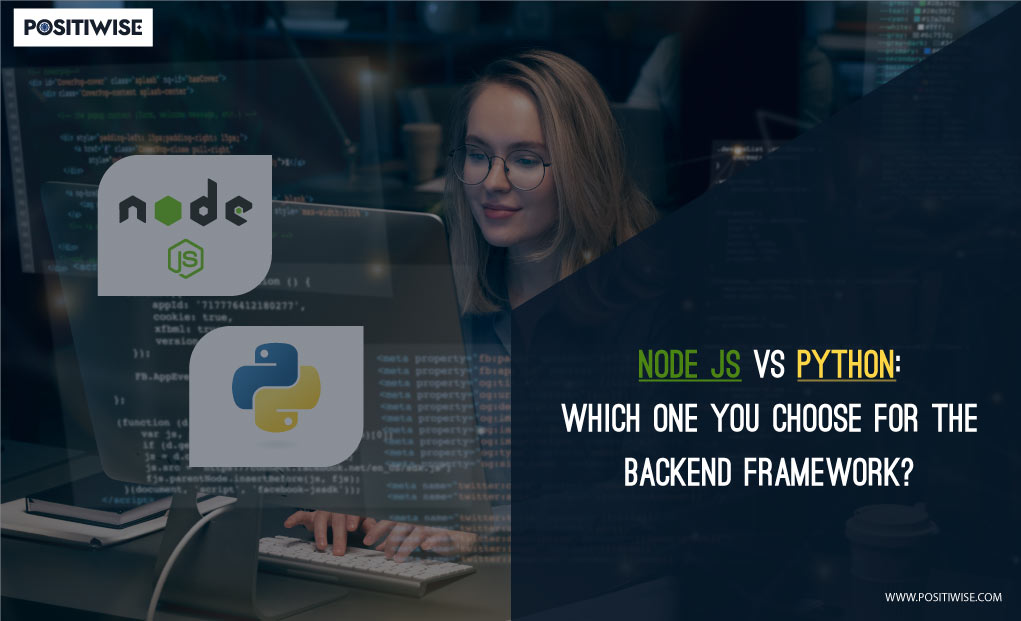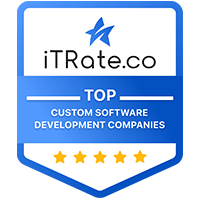Every day, we navigate through various web apps, and all these are built using different programming and scripting languages, handling client and server-side operations.
However, PHP and Python are always on the top of a developer’s list to fabricate the server-side of a software. And while planning the project lifecycle, every team goes through a debate on PHP vs Python.
And the debate is not limited to generally analyzing the features, as it gets extended until the development team is not assured, which is better for web development PHP or Python.
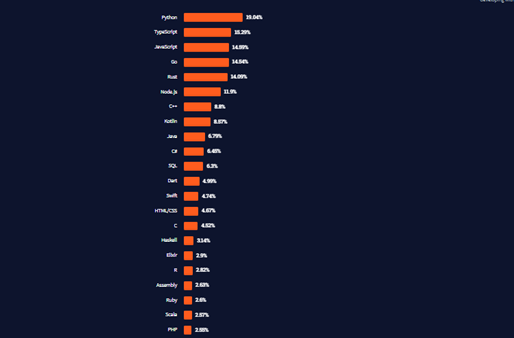
As per the reports of Stack Overflow of 2021, Python is the most preferred language for server-side development, and PHP is way behind as compared to it.
So, let’s go through this detailed differentiation of PHP vs. Python.
What is Python?
Python is a programming and scripting language, released in 1991, which has gained popularity due to its modular architecture and simple syntax.
It is appraised from programming freshers to data scientists, as it offers a wide array of features to develop cross-platform compatible applications. In addition, you can assuredly create web applications, link databases, and perform big data analysis through complex mathematical equations.
It’s always been a preferred choice for large software projects and enthusiasts to learn the fundamentals and advancements in programming.
Features of Python
- Learning, writing, and maintaining Python code is easy compared to other programming languages.
- It comes with incorporated automated garbage collection features enabled by default.
- Python code can be embedded with C, C++, and Java to extend the application’s features.
- Its built-in debugger can identify all the code’s low-level and high-level errors, exceptions, and bugs.
- It is a database-friendly language, connecting the app with all the major database management systems.
- It allows the addition of low-level modules in the Python interpreter.
Pros of Python
- Cross-platform compatible codes are generated.
- Provides TensorFlow library for performing complex mathematical equations, aiding data scientists in their core operations.
- It is an Easy-to-learn and easy-to-maintain language.
- Its WORA functionality leads to makes code portable.
- Applications with Graphical User Interface can also be developed.
- Produced code can be reused.
Cons of Python
- Ample storage space and processing power are required for seamless development.
- Duck typing can cause run-time errors.
- Functions a little bit slower than other web development-oriented languages.
- Testing Python-based apps take much longer to ensure that end-users are secure.
- Sometimes error detection is not possible due to dynamic code writing.
What is PHP?
Hypertext Pre-processor is a programming language, particularly innovated for developing a website and web applications. It is an open-source technology, which aids PHP developers in creating and maintaining user-driven websites impeccably.
Moreover, it can be easily integrated with significant DBMS and web servers running on different operating systems.
Features of PHP
- PHP-based applications can be easily connected with MySQL and Oracle databases.
- Due to its open-source nature, it can be freely downloaded and utilized for any project.
- User access reports can be generated, providing access to the log-in.
- Error reporting constants are predefined, displaying error messages and notices to the developer.
- Compatible with Apache and IIS servers.
- Performance and speed don’t affect, even when running on the server-side.
Pros of PHP
- NoSQL and PostgreSQL databases can be linked with PHP.
- PHP applications can be run on Windows, Linux, and UNIX operating systems.
- In-built modules and functions are available to link SQL databases effortlessly.
- An extensive and secure ecosystem is provided to process data, maintaining its confidentiality and integrity.
- Various web frameworks are available for creating responsive websites.
Cons of PHP
- It is not possible to modify its core behavior.
- Lacks in securing the overall application.
- Its ASCII text file is available, which makes it more vulnerable.
- It’s harder to learn as compared to Python.
Which is Better for Web Development?
Python vs PHP Speed
As per the survey performed in 2021, 46% of the users don’t revisit the website if its loading time is more than 2 or 3 seconds. Due to this, software speed is an essential aspect to focus upon.
Backend developed using PHP and Python is considered more responsive than other technologies. However, there is still a gap between their performance metrics.
The latest PHP version 7 is considered the fastest backend technology for applications, handling an immense amount of user data at a single time. In addition, Zend Engine 3.0 is also released with the latest updates of PHP, enabling applications to process data at 2X speed.
In contrast, Python is considered a bit slow and is only appraised for developing simple business applications, where a slight delay in output is not an issue.
For example, if you are going to develop a University Management System where many students and staff members log in simultaneously, you must go for PHP rather than Python.
Flexibility and Scalability
With the growing market and customer demands, it is obvious to see a change in your business strategies. But, have you ever wondered how time-consuming and costly it can be to adopt a new system whenever business demands are modified.
To get hassle-free from such tasks and save cost, you must select a scalable programming technology.
In Python vs PHP, both are preferred for developing a web application due to the high availability of versatile libraries and frameworks based on them. But, Python is considered more scalable, as it offers to implement Artificial Intelligence and Machine Learning programs in the Software.
In addition, independent and decoupled elements can also be embedded using Python and can be unplugged at any time with dynamic business models.
Further, PHP is not as compatible with advanced technologies, and it is time-consuming and complex to modify it instantly. As a result, Python wins this round, providing more scalability to your business solutions.
Availability of Resources
Hardware, Software, and humans are the most vital resources required to fabricate cutting-edge business software.
All these resources must be efficiently and economically available. It aids in precisely monitoring, controlling, and maintaining the software development life cycle and integrating all the necessary features in the application.
Both PHP and Python don’t require any high-end hardware component to create a small and medium application. However, if you want a solution incorporated with AI and ML, you will need an advanced computer system to develop, test, and maintain it.

Moreover, you can effortlessly find the top industry experts for your PHP project, as it is widely used worldwide. Also, there are various online repositories, learning resources, and semi-developed codebases, which you can access freely for your software creation.
Python vs PHP for Backend (Compatibility with MySQL)
The database is one of the essential components of an app’s backend, as it stores user input, processes it, organizes it, and supports it to provide relevant output. For this purpose, the SQL database is preferred chiefly and utilized.
PHP is considered the most reliable technology, linked with MySQL database to furnish any application, from a simple website to enterprise management systems. Also, PHP offers in-built modules and functions, which leverages linking database without the need for any third-party tool.
Moreover, Software built using PHP and MySQL can run across multiple operating systems and devices, saving the cost of developing different solutions for a particular OS.
On the other hand, external tools and plugins are required to connect the Python codebase and MySQL database. You need to go through the Python documentation to find the relevant plugin for your project.
These processes and tasks can be tricky and more time-consuming; hence, PHP is suitable for MySQL.
Overall Security
Maintaining data confidentiality, integrity, and availability is every organization’s topmost priority.
Developing a secure application helps gain user trust and improve market reputation, leading to enhanced market capital. With rapidly evolving cyber-attacks, such as Code Execution, Overflow, Memory corruption, DDoS, and so forth, it is essential to pick out a secure programming language for your project.
As per the statistics provided on the official website of CVE Details, PHP is more vulnerable to cyber threats than Python due to more vulnerable loopholes discovered in it, which allow illegitimate actors to perform cyber-attacks and breach data.
PHP comes into action far earlier than Python, but it lacks behind in some areas to secure the data flow between server-client architecture.
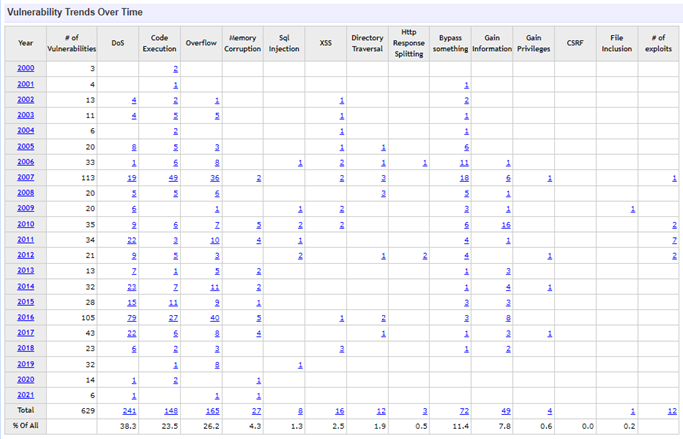
Python provides several in-built tools and modules to develop robust business solutions, which cover edge-to-edge business requirements and process each operation in a secure environment.
Also, as per the latest CVE details, very few vulnerabilities are discovered in Python-based applications, making them more secure than PHP.
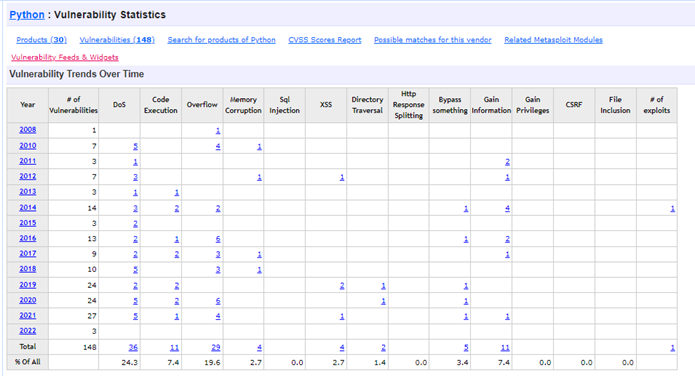
Library Management
Various libraries are utilized while developing a cutting-edge business solution, and packages managers handle all their functions.
Python uses Pip as its package manager, whose primary function is to handle and maintain python libraries in an application. It is an essential tool of every Python developer, and one should know about its implementation to grow in the development domain.
On the contrary, PHP’s package manager doesn’t offer all the fundamental features, and it also requires an external tool to work efficiently.
Python must get all the points if you have to select a better package manager with effective and impeccable library management.
Web Frameworks
For developing a scalable website or web-based application, you can adopt frameworks offered by both PHP and Python.
The two most robust PHP frameworks, Laravel and Symfony, are widely used by developers, and its extensive community support is one of the reasons behind its popularity.
In contrast, Flask and Django are the two commonly implemented Python-based web frameworks, which are highly flexible and secure. You can rely on any of these frameworks to build a cutting-edge web-based business solution to achieve your long-term goals.
Python 3 vs PHP 7 Performance
Performance is the most critical metric that organizations constantly analyze and maintain to reduce bounce rate and optimize visitor conversion.
A recent study performed by Google evaluated that the less the loading speed, the less the bounce rate. Hence, websites taking load time up to 3 seconds have the most probability to retain user and convert it into potential customers.
Python is the clear winner for enhancing the overall performance of an application, as it employs a Just-In-Time compiler, leading to saving time, as once the file is compiled, you don’t have to recompile it every time you run it.
On the other side, PHP’s compiler is not advanced as Python. It only assures that PHP 7 is faster than its previous versions but is behind Python 3.
So, Python is a clear winner if you are looking for high performance.
Debugging
Both Python and PHP are comprised of an in-built debugger for error-checking and removing bugs from the code.
Python Debugger or PDB allows developers to flawlessly work in a dynamic and agile environment without defining the initial code elements. Whereas XDebug package, the default package of PHP is a bit slower and outdated, leaving some errors undiscovered.
As a result, vulnerable loopholes are produced in applications, and enterprises face data breaches.
As per the security and faster-development perspective, Python wins this round again.
PHP vs Python – The Technical Difference Table
| Feature | PHP | Python |
|---|---|---|
| Type | Scripting language | General purpose language |
| Designed for | Web development | General software development |
| Speed | Faster execution | Slower execution |
| Syntax | C-like with dollar signs | Indentation and whitespace matter |
| Code readability | More verbose | Cleaner with fewer lines |
| Database access | Built-in support | Requires external libraries |
| Framework support | Laravel, Symfony, CodeIgniter | Django, Flask, Pyramid |
| Library ecosystem | Good | Excellent, vast selection |
| Scalability | Good | Excellent for large apps |
| Machine learning | Limited support | Excellent libraries like TensorFlow |
| Interoperability | Integrates well with Java and .NET | Integrates well with C, C++, Java |
| Job market demand | Declining | Growing |
Save Time and Resources with Custom-Built Web Apps
Tired of piecing together disjointed systems? Our expert web developers build fully customized web apps to seamlessly streamline your workflows. Save time, cut costs, and drive efficiency with tailored solutions made for your unique needs.

Final Score
In most aspects, Python is the clear winner of this debate, but it cannot help you in every software project. Before selecting any particular programming language, you must always consider your project scope and business goals.
Currently, PHP is the leading language in the web development market. Still, as we have analyzed in this article, Python is rapidly taking it over with its scalable, secure, and robust features.
But, you should always analyze your business requirements and cross-verify them with the technology before picking it out for PHP Development Services.
Expert in Marketing Strategy and Brand Recognition
Jemin Desai is Chief Marketing Officer at Positiwise Software Pvt Ltd, he is responsible for creating and accelerating the company’s marketing strategy and brand recognition across the globe. He has more than 20 years of experience in senior marketing roles at the Inc. 5000 Fastest-Growing Private Companies.
